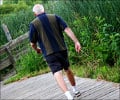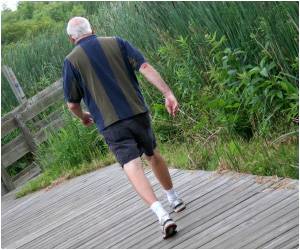Nordic walking facilitates people with heart failure to exercise more intensely compared to walking without poles.

Aerobic exercise in patients with heart failure improves quality of life and reduces heart failure related hospitalisations. However, many heart failure patients find it difficult to exercise. In Nordic walking, people use poles and their arms copy the motions of cross country skiing. It is one of the fastest developing forms of physical activity in Europe and is safe for older patients, especially those above the age of 65, making it a good possibility for patients with heart failure.
For the study (abstract P939) 12 patients with heart failure and 12 healthy adults did two submaximal six-minute walking tests on a level treadmill at a constant speed of 5km per hour. Participants did one test with Nordic walking poles and one without.
The researchers compared the cardiorespiratory responses during walking with and without poles. In the healthy group, compared to walking without poles Nordic walking increased oxygen consumption (VO2) by 4.9 ml/kg/minute (a median increase of 37%) and led to a higher respiratory quotient (median increase of 5%). Peak heart rate was 20 beats per minute higher, maximal systolic blood pressure (BP) was 15 mmHg higher, and fatigue level was increased by 2 points on the Borg Scale. All results were significant (p=0.05).
In patients with heart failure, compared to walking without poles Nordic walking increased VO2 by 2.9 ml/kg/minute (14.7%) and respiratory quotient by 18%. Peak heart rate was 15 beats per minute higher, maximal BP was 10 mmHg higher, and fatigue level was increased by 2 points. All results were significant (p=0.05).
In both the healthy group and patients with heart failure, there were no signs of cardiac ischaemia and no significant arrhythmias during the tests.
Advertisement
"In Nordic walking we have a big workload because we use additional muscle groups," says lead author Andrzej Lejczak, a physiotherapist at the Military Hospital in Wroclaw, Poland, and a PhD student at the University School of Physical Education in Wroclaw. "We walk with four limbs, so we're exercising our arms and legs at the same time - that's why we have such a beneficial response."
Advertisement
Patients simply need to purchase Nordic walking poles, which cost about €50, then take two or three one-hour lessons. After that they can exercise on their own outdoors, without needing to visit the gym.
Previous studies by Mr Lejczak have shown that Nordic walking improves quality of life, aerobic capacity and physical fitness in heart failure patients.
Source-Eurekalert















